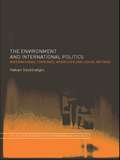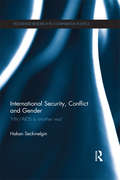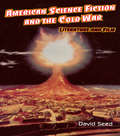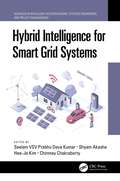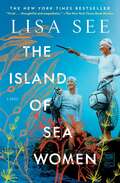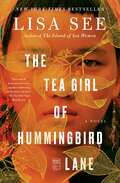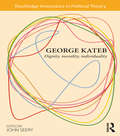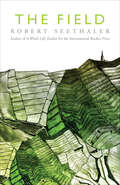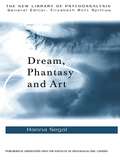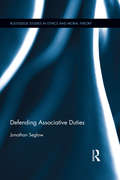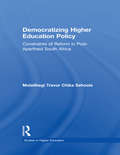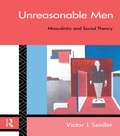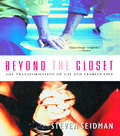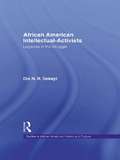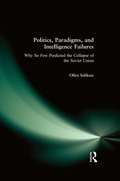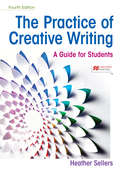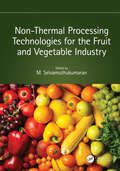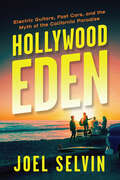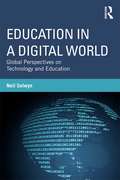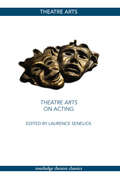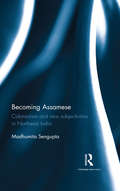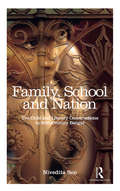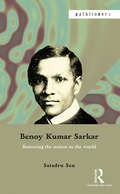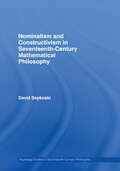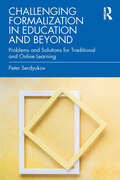Special Collections
Benetech’s Global Certified Accessible Titles
Description: Benetech’s GCA program is the first independent third-party EPUB certification to verify ebook accessibility. By creating content that is born accessible, publishers can meet the needs of all readers. Learn more: https://bornaccessible.benetech.org/
- Table View
- List View
The Environment and International Politics
by Hakan SeckinelginThis new study shows how environmental issues represent a deep problem in conceptualising the relationship between human beings and nature. This key relationship grounds the implicit ethical and political concerns of International Relations and our understandings of environmental politics. It demonstrates that the core theoretical orientations of the study of International Relations are not only incapable of understanding and responding to contemporary problems, but are profoundly complicit in creating the ecological problems in the first place.This major book develops a sense of these realities based on the thinking of Martin Heidegger. It forwards new ways of rethinking the environmental questions and addresses crucial issues such as sovereignty, the International Law of The Sea, the Kyoto Protocol, Northern Alaskan oil exploration and exploitation and the impact of the United Nations Convention on the Law of The Sea III. This is essential specialist reading for readers concerned with the environment.
International Security, Conflict and Gender
by Hakan SeckinelginThis book challenges the conventional security-based international policy frameworks that have developed for dealing with HIV/AIDS during and after conflicts, and examines first-hand evidence and experiences of conflict and HIV/AIDS. Since the turn of the century international policy agenda on security have focused on HIV/AIDS only as a concern for national and international security, ignoring people’s particular experiences, vulnerabilities and needs in conflict and post-conflict contexts. Developing a gender-based framework for HIV/AIDS-conflict analysis, this book draws on research conducted in Burundi to understand the implications of post-conflict demobilization and reintegration policies on women and men and their vulnerability to HIV/AIDS. By centring the argument on personal reflections, this work provides a critical alternative method to engage with conflict and HIV/AIDS, and a much richer understanding of the relationship between the two. International Security, Conflict and Gender will be of interest to students and scholars of healthcare politics, security and governance.
American Science Fiction and the Cold War
by David SeedFirst Published in 1999. Routledge is an imprint of Taylor & Francis, an informa company.
Hybrid Intelligence for Smart Grid Systems
by Seelam VSV Prabhu Deva KumarThis book provides an overview of distributed control and distributed optimization theory, followed by specific details on industrial applications to smart grid systems. It discusses the fundamental analysis and design schemes for developing actual working smart grids and covers all aspects concerning the conventional and nonconventional methods of their use. Hybrid Intelligence for Smart Grid Systems provides an overview of a smart grid, along with its needs, benefits, challenges, and existing structure and describes the inverter topologies adopted for integrating renewable power, and provides an overview of its needs, benefits, challenges, and possible future technologies. This pioneering book is a must-read for researchers, engineering professionals, and students, giving them the tools needed to move from the concept of a smart grid to its actual design and implementation. Moreover, it will enable regulators, policymakers, and energy executives to understand the future of energy delivery systems towards safe, economical, high-quality power delivery in a dynamic and demanding environment.
The Island of Sea Women
by Lisa SeeA new novel from Lisa See, the New York Times bestselling author of The Tea Girl of Hummingbird Lane, about female friendship and family secrets on a small Korean island.
Mi-ja and Young-sook, two girls living on the Korean island of Jeju, are best friends that come from very different backgrounds. When they are old enough, they begin working in the sea with their village’s all-female diving collective, led by Young-sook’s mother. As the girls take up their positions as baby divers, they know they are beginning a life of excitement and responsibility but also danger. Despite their love for each other, Mi-ja and Young-sook’s differences are impossible to ignore.
The Island of Sea Women is an epoch set over many decades, beginning during a period of Japanese colonialism in the 1930s and 1940s, followed by World War II, the Korean War and its aftermath, through the era of cell phones and wet suits for the women divers. Throughout this time, the residents of Jeju find themselves caught between warring empires. Mi-ja is the daughter of a Japanese collaborator, and she will forever be marked by this association. Young-sook was born into a long line of haenyeo and will inherit her mother’s position leading the divers in their village. Little do the two friends know that after surviving hundreds of dives and developing the closest of bonds, forces outside their control will push their friendship to the breaking point.
This beautiful, thoughtful novel illuminates a world turned upside down, one where the women are in charge, engaging in dangerous physical work, and the men take care of the children. A classic Lisa See story—one of women’s friendships and the larger forces that shape them—The Island of Sea Women introduces readers to the fierce and unforgettable female divers of Jeju Island and the dramatic history that shaped their lives.
A New York Times Bestseller
The Tea Girl of Hummingbird Lane
by Lisa SeeFrom #1 New York Times bestselling author Lisa See, &“one of those special writers capable of delivering both poetry and plot&” (The New York Times Book Review), a moving novel about tradition, tea farming, and the bonds between mothers and daughters.In their remote mountain village, Li-yan and her family align their lives around the seasons and the farming of tea. For the Akha people, ensconced in ritual and routine, life goes on as it has for generations—until a stranger appears at the village gate in a jeep, the first automobile any of the villagers has ever seen. The stranger&’s arrival marks the first entrance of the modern world in the lives of the Akha people. Slowly, Li-yan, one of the few educated girls on her mountain, begins to reject the customs that shaped her early life. When she has a baby out of wedlock—conceived with a man her parents consider a poor choice—she rejects the tradition that would compel her to give the child over to be killed, and instead leaves her, wrapped in a blanket with a tea cake tucked in its folds, near an orphanage in a nearby city. As Li-yan comes into herself, leaving her insular village for an education, a business, and city life, her daughter, Haley, is raised in California by loving adoptive parents. Despite her privileged childhood, Haley wonders about her origins. Across the ocean Li-yan longs for her lost daughter. Over the course of years, each searches for meaning in the study of Pu&’er, the tea that has shaped their family&’s destiny for centuries. A powerful story about circumstances, culture, and distance, The Tea Girl of Hummingbird Lane paints an unforgettable portrait of a little known region and its people and celebrates the bond of family.
George Kateb
by John SeeryGeorge Kateb’s writings have been innovatory in exploring the fundamental quandary of how modern democracy—sovereignty vested in the many—might nevertheless protect, respect, promote, even celebrate the singular, albeit ordinary individual. His essays, often leading to unexpected results, have focused on many inter-related topics: rights, representation, constitutionalism, war, evil, extinction, punishment, privacy, patriotism, and more. This book focuses in particular on his thought in three key areas: Dignity These essays exhibit the breadth and complexity of Kateb’s notion of dignity and outline some implications for political theory. Rather than a solely moral approach to the theory of human rights, he elaborates a human-dignity rationale for the very worth of the human species Morality Here Kateb challenges the position that moral considerations are often too demanding to have a place in the rough-and-tumble of modern politics and political analysis. Rejecting common justifications for the propriety of punishment, he insists that state-based punishment is a perplexing moral problem that cannot be allayed by repairing to theories of state legitimacy. Individuality These essays gather some of Kateb’s rejoinders and correctives to common conceptions and customary critiques of the theory of democratic individuality. He explains that Locke’s hesitations and religious backtracking are instructive, perhaps as precursors for the ways in which vestigial beliefs can still cloud moral reasoning.
The Field
by Robert SeethalerFrom Robert Seethaler, the International Booker Prize finalist for A Whole Life and bestselling author of The Tobacconist, comes a tale of life and death and human connection, told through the voices of those who have passed on. The Field is the oldest part of the cemetery in Paulstadt, where some of the small town’s most outspoken residents can be found. From their graves, they tell stories. Some recall just a moment — perhaps the one in which they left this world, perhaps the one they now realize changed the course of their life forever. Some remember all the people they’ve been with, or the only person they ever loved. This chorus of voices — young, old, rich, poor — builds a picture of a community, seen from below ground. The streets of the sleepy provincial town are given shape and meaning by those who lived, loved, worked, mourned, and died there. The Field is a constellation of human lives — each one different yet connected to countless others — that shows how existence, for all its fleetingness, still has profound meaning.
Dream, Phantasy and Art
by Hanna SegalHanna Segal's work, especially on symbolism, aesthetics, dreams, and the exploration of psychotic thinking, has established her as an outstanding figure in psychoanalysis, particularly in psychoanalysis of the Kleinian tradition. In Dream, Phantasy and Art she reworks her ideas on these topics and brings them vividly alive in a new integration which links them afresh to the work of Freud, Klein, and Bion. Throughout the book, the clinical illustrations the author has selected brilliantly spotlight the theory, touching the imagination, and fixing even the most difficult ideas permanently in the reader's mind. In a mutually enhancing relationship, theory and clinical example are combined, and then applied, to create the author's new and original theories of art and aesthetics. As Betty Joseph notes in her foreword, Segal's writing, and in particular this book, does much to enrich psychoanalysis not only because of the clarity and intelligence but also because of the depth and breadth of her interests and her clinical imagination.
Defending Associative Duties
by Jonathan SeglowThis book explores the associative duties we owe to our children, parents, friends, colleagues, associates and compatriots and defends a novel account which justifies such duties through the realization of values that are produced in these various kinds of social relationships. Seglow engages with several key contemporary debates including parental rights over children’s education, the burdens of eldercare, permissible partiality to friends, and global justice versus compatriot duties.
Democratizing Higher Education Policy
by M.T. SehooleThis book was written with the purpose of analyzing the challenges faced by the post-apartheid government in South Africa with regard to reform of higher education. It covers the apartheid context of higher education, resistance to the system and its ultimate demise, democratic processes in post-apartheid reform agenda and how this agenda was emptied of its radical content as a result of global and local pressures. Highlighted are key constraints in the reform process, including the compromise pact agreed upon between the apartheid government and the ruling African National Congress, the rapidly globalizing environment underpinned by neoliberal principles within which South Africa's transition took place, shifts in macro-economic policies of government towards neo-liberal policy, the inheritance of the bureaucracy and the inexperience of new government officials. These are presented in a narrative style that combines the author's experience, the voices of key players involved and important data from a range of documentary sources. This is the first single authored book in post-apartheid South African that has systematically looked at higher education reform.
Unreasonable Men
by Victor J. SeidlerThis much needed book is the first to show how dominant forms of masculinity are implicated in the traditions of social theory that have emerged since the Enlightenment. The author shows how an 'unreasonable' form of reason has emerged from the separation of reason from emotion, mind from body, nature from culture, public from private, matter from spirit - the dualities that have shaped our vision of modernity. The book argues that men need to explore critically their power and experience which has been rendered invisible by the dominant traditions of social theory. Instead of legislating for others they have to learn to speak more personally for themselves.
Beyond the Closet
by Steven SeidmanGay life has become increasingly open in the last decade. In Beyond the Closet , Steven Seidman, a well-known author and leading scholar in sexuality, is the first to chronicle this lifestyle change and to look at the lives of contemporary gays and lesbians to see how their "out" status has changed. This compelling, well-written, and smart account is an important step forward for the gay and lesbian community.
African American Intellectual-Activists
by Dia N. SekayiThis study examines the narrated life experiences of 11 African American intellectual-activists. An intellectual-activist is defined as a person whose education has provided him or her with a body of knowledge to which he/she is continually adding (intellectual self) and who works daily for, or has a career dedicated to, the betterment of African American people (activist self). The voices of the subjects focus on the events in their lives that contributed to their development as intellectuals and activists. Discussions of the individuals' backgrounds illuminate the forces that influenced their life experiences and guided their actions toward involvement with the struggle to improve the lives of the African American community. The overarching theme in these life stories is the possession of a positive African American self-concept. The study explores the ways in which the subjects developed this positive self-concept, how this self-concept influenced the goals of their activism, and how they define progress toward these goals.
Politics, Paradigms, and Intelligence Failures
by Ofira SeliktarWashington's failure to foresee the collapse of its superpower rival ranks high in the pantheon of predictive failures. The question of who got what right or wrong has been intertwined with the deeper issue of "who won" the Cold War. Like the disputes over "who lost" China and Iran, this debate has been fought out along ideological and partisan lines, with conservatives claiming credit for the Evil Empire's demise and liberals arguing that the causes were internal to the Soviet Union. The intelligence community has come in for harsh criticism for overestimating Soviet strength and overlooking the symptoms of crisis; the discipline of "Sovietology" has dissolved into acrimonious irrelevance. Drawing on declassified documents, interviews, and careful analysis of contemporaneous literature, this book offers the first systematic analysis of this predictive failure at the paradigmatic, foreign policy, and intelligence levels. Although it is focused on the Soviet case, it offers lessons that are both timely and necessary.
The Practice of Creative Writing
by Heather SellersWhen it comes to writing, The Practice of Creative Writing has a simple message: you can do this, and it’s worthwhile to try. Designed for students in the introductory course, The Practice of Creative Writing teaches writers how to trust their own voice, experiment with form, and develop a writing process that allows them to spend more productive time at the desk. Rather than locking into one genre early, writers are encouraged to work among and in between genres and to focus on creating a writing practice that privileges close observation, patience, and techniques of pattern, energy, and shape.
Heather Sellers, who writes in multiple genres herself, has developed a lively, welcoming, student-centered approach that teaches creative concentration, close reading, and generating pages. She provides opportunities to be playful and to experiment at the same time that she teaches students the importance of discipline, form, and craft. Heather Sellers is a certified online instructor, and The Practice of Creative Writing is designed to be used in traditional face-to-face classrooms or in online education.
Each chapter begins with objectives for that module. Prompts and writing practices are carefully sequenced. Every chapter ends with both genre-specific writing projects alongside hybrid and experimental prompts. The readings included in this new edition invite students to experience an even wider range of innovative and new literatures. A new chapter on creative ways to approach revision as a shaping practice engaged throughout the writing process helps students work harder on their writing.
Non-Thermal Processing Technologies for the Fruit and Vegetable Industry
by M. SelvamuthukumaranFruits and vegetables rapidly spoil due to growth of microorganisms, which further render them unsafe for human consumption. The traditional methods of food preservation, which involves drying, canning, salting, curing, and chemical preservation, can significantly affect food quality by diminishing nutrients during heat processing. This can alter the texture of the products, leave chemical residues in the final processed products, which in turn has greater impact over consumers' safety and health concerns. To combat this problem, various current non-thermal food processing techniques can be employed in fruit and vegetable processing industries to enhance consumer satisfaction for delivering wholesome food products to the market, thus increasing demand. Non-Thermal Processing Technologies for the Fruit and Vegetable Industry introduces the various non-thermal food processing techniques especially employed for fruits and vegetables processing industries; it deals with the effect of several non-thermal processing techniques on quality aspects of processed fruits and vegetable products and keeping quality and consumer acceptability. Key Features: Describes the high-pressure processing techniques employed for processing fruit and vegetable based beverages Discusses the safety aspects of using various innovative non-thermal based technologies for the fruits and vegetables processing industries. Explains ozone application, cold plasma, ultrasound and UV irradiation for fruits and vegetables with their advantages, disadvantages, process operations, mechanism for microbes in activation etc. Presents the commercially viable and economically feasible non-thermal processing technologies for fruit and vegetable industry. This book addresses professors, scientists, food engineers, research scholars, students and industrial personnel for stability enhancement of fruit- and vegetable-based food products by using novel non-thermal food processing techniques. Readers will come to know the current and emerging trends in use of non-thermal processing techniques for its application in several fruit- and vegetable-based food processing industries.
Hollywood Eden
by Joel Selvin“Hollywood Eden brings the lost humanity of the record business vividly back to life … [Selvin’s] style is blunt, unpretentious and brisk; he knows how to move things along entertainingly … Songs about surfboards and convertibles had turned quaint, but in this book, their coolness is restored.” — New York Times From surf music to hot-rod records to the sunny pop of the Beach Boys, Jan & Dean, the Byrds, and the Mama’s & the Papa’s, Hollywood Eden captures the fresh blossom of a young generation who came together in the epic spring of the 1960s to invent the myth of the California Paradise. Central to the story is a group of sun-kissed teens from the University High School class of 1959 — a class that included Jan & Dean, Nancy Sinatra, and future members of the Beach Boys — who came of age in Los Angeles at the dawn of a new golden era when anything seemed possible. These were the people who invented the idea of modern California for the rest of the world. But their own private struggles belied the paradise portrayed in their music. What began as a light-hearted frolic under sunny skies ended up crashing down to earth just a few short but action-packed years later as, one by one, each met their destinies head-on. A rock ’n’ roll opera loaded with violence, deceit, intrigue, low comedy, and high drama, Hollywood Eden tells the story of a group of young artists and musicians who bumped heads, crashed cars, and ultimately flew too close to the sun.
Education in a Digital World
by Neil SelwynDrawing on a wealth of theoretical and empirical work, Education in a Digital World tackles a number of pressing questions, such as, how are ‘global’ trends in educational technology refracted through national policies and processes? How exactly are educational technologies linked to issues of global economics and the fortunes of national and international economies? To what extent are digital technologies implicated in the commercialisation, marketization and commodification of education? These questions, and others, are addressed throughout eight wide-ranging chapters, which consider topics such as the national policy strategies of countries across North and South America, Europe and East Asia, the educational technology portfolios of international organizations such as the United Nations and Microsoft, as well as the role of education and technology in international development and the on-going efforts to provide ‘one laptop per child’ across low-income regions and countries. Through these examples Selwyn develops a detailed analysis of education, technology and globalisation, drawing together arguments and debates from various academic perspectives. Written in a detailed but accessible manner, this is an essential book for anyone wishing to gain a better understanding of the role of education and technology in contemporary globalised society.
Theatre Arts on Acting
by Laurence SenelickDuring its fifty year run, Theatre Arts Magazine was a bustling forum for the foremost names in the performing arts, including Stanislavski, Laurence Olivier, Lee Strasberg, John Gielgud and Shelley Winters. Renowned theatre historian Laurence Senelick has plundered its stunning archives to assemble a stellar collection of articles on every aspect of acting and theatrical life.
Becoming Assamese
by Madhumita SenguptaThis book explores the making of colonial Northeast India and offers a new perspective to the study of the Assamese identity in the nineteenth century as a distinctly nineteenth-century cultural phenomenon, not confined to linguistic parameters alone. It studies crucial markers of the self — history, customs, food, dress, new religious beliefs — and symbols considered desirable by the provincial middle class and the way these fitted in with the latter’s nationalist subjectivities in the face of an emphatic Bengali cultural nationalism. The author shows how colonialism was intrinsically linked to the assertion of middle class intelligentsia in the region and was instrumental in eroding the essential malleability of societal processes nurtured by the Ahom state. Rich with fresh research data, this book will be useful to scholars and researchers of history, political science, area studies, and to anyone interested in understanding Northeast India.
Family, School and Nation
by Nivedita SenThis seminal work examines the concurrence of childhood rebellion and conformity in Bengali literary texts (including adult texts), a pertinent yet unexplored area, making it a first of its kind. It is a study of the voice of child protagonists across children’s and adult literature in Bengali vis-à-vis the institutions of family, the education system, and the nationalist movement in the ninenteenth and twentieth centuries.
Benoy Kumar Sarkar
by Satadru SenThis book explores the life and times of the pioneering Indian sociologist Benoy Kumar Sarkar. It locates him simultaneously in the intellectual history of India and the political history of the world in the twentieth century. It focuses on the development and implications of Sarkar’s thinking on race, gender, governance and nationhood in a changing context. A penetrating portrait of Sarkar and his age, this book will be of great interest to scholars and researchers of modern Indian history, sociology, and politics.
Nominalism and Constructivism in Seventeenth-Century Mathematical Philosophy
by David SepkoskiWhat was the basis for the adoption of mathematics as the primary mode of discourse for describing natural events by a large segment of the philosophical community in the seventeenth century? In answering this question, this book demonstrates that a significant group of philosophers shared the belief that there is no necessary correspondence between external reality and objects of human understanding, which they held to include the objects of mathematical and linguistic discourse. The result is a scholarly reliable, but accessible, account of the role of mathematics in the works of (amongst others) Galileo, Kepler, Descartes, Newton, Leibniz, and Berkeley. This impressive volume will benefit scholars interested in the history of philosophy, mathematical philosophy and the history of mathematics.
Challenging Formalization in Education and Beyond
by Peter SerdyukovChallenging Formalization in Education and Beyond addresses the effects of today’s attempts to organize knowledge, processes, and performance in education, particularly in its ever-growing digital environments. As on-site, blended, and fully online learning become deeply interdependent, secondary and higher education managers and instructors who seek to integrate, apply, and teach within these formats using standardized rules, assessments, algorithms, and accountability structures may be doing unintended harm to their students. Focusing on students’ performance, health, cognition, behavior, and learning outcomes, this book analyses how current trends, methods, and policies in formalization can be challenged and corrected to ensure high-quality education. Scholars, educators, administrators, and designers of traditional, asynchronous, precision, automated, and micro-learning formats will come away with new insights and pragmatic solutions for engaging students in more active, participatory, and creative activities.
